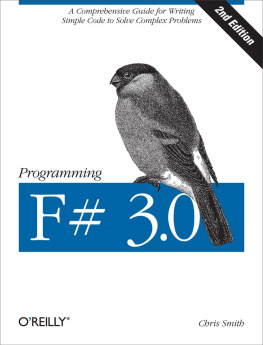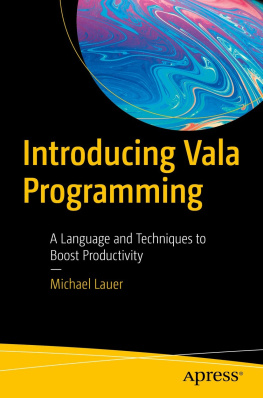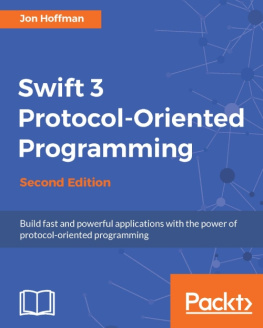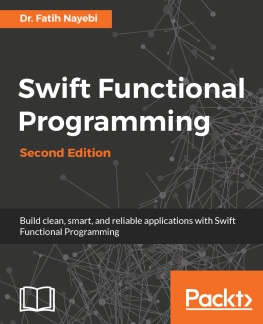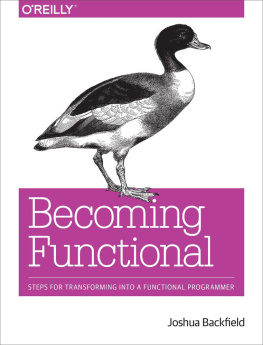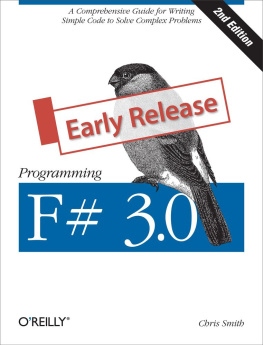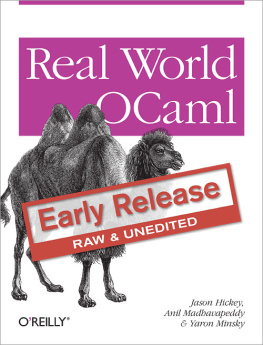Smith - Programming F# 3.0
Here you can read online Smith - Programming F# 3.0 full text of the book (entire story) in english for free. Download pdf and epub, get meaning, cover and reviews about this ebook. year: 2012, publisher: OReilly Media, genre: Computer. Description of the work, (preface) as well as reviews are available. Best literature library LitArk.com created for fans of good reading and offers a wide selection of genres:
Romance novel
Science fiction
Adventure
Detective
Science
History
Home and family
Prose
Art
Politics
Computer
Non-fiction
Religion
Business
Children
Humor
Choose a favorite category and find really read worthwhile books. Enjoy immersion in the world of imagination, feel the emotions of the characters or learn something new for yourself, make an fascinating discovery.
Programming F# 3.0: summary, description and annotation
We offer to read an annotation, description, summary or preface (depends on what the author of the book "Programming F# 3.0" wrote himself). If you haven't found the necessary information about the book — write in the comments, we will try to find it.
Why learn F#? With this guide, youll learn how this multi-paradigm language not only offers you an enormous productivity boost through functional programming, but also lets you develop applications using your existing object-oriented and imperative programming skills.
Smith: author's other books
Who wrote Programming F# 3.0? Find out the surname, the name of the author of the book and a list of all author's works by series.
Programming F# 3.0 — read online for free the complete book (whole text) full work
Below is the text of the book, divided by pages. System saving the place of the last page read, allows you to conveniently read the book "Programming F# 3.0" online for free, without having to search again every time where you left off. Put a bookmark, and you can go to the page where you finished reading at any time.
Font size:
Interval:
Bookmark:

Beijing Cambridge Farnham Kln Sebastopol Tokyo
If you purchased this ebook directly from oreilly.com, you have the following benefits:
DRM-free ebooksuse your ebooks across devices without restrictions or limitations
Multiple formatsuse on your laptop, tablet, or phone
Lifetime access, with free updates
Dropbox syncingyour files, anywhere
If you purchased this ebook from another retailer, you can upgrade your ebook to take advantage of all these benefits for just $4.99. to access your ebook upgrade.
Please note that upgrade offers are not available from sample content.
Have you ever been in a hurry and pounded in a nail using something other than a hammer? Or perhaps settled an argument concerning distances with the length of my arm is about 20 inches, and thats about two arm lengths...? You might not be willing to fall for such obviously flawed shortcuts, but as your humble author, I will admit that I have.
There is elegance to using the right tool for the job. And, just like a hammer or a tape measure, programming languages are tools like any other. Throughout this book, you will discover that although F# isnt the best tool for every situation, it is the perfect tool for some situations.
This book is about showing you how to use the F# programming language as a general purpose tool, with an emphasis on the specific domains where it can lead to dramatic boosts in productivity.
Along the way, you will pick up a knack for functional programming, a semi-mysterious collection of concepts that can help you rethink your programs regardless of the host programming language.
So what actually is F#? In a nutshell, F# is a multiparadigm programming language built on .NET, meaning that it supports several different styles of programming natively. Ill spare you the history of the language and instead just go over the big bullets:
F# supports imperative programming. In F#, you can modify the contents of memory, read and write files, send data over the network, and so on.
F# supports object-oriented programming. In F#, you can abstract code into classes and objects, enabling you to simplify your code.
F# supports functional programming, which is a style of programming that emphasizes what a program should do, not explicitly how the program should work.
F# is statically typed. Being statically typed means that type information is known at compile time, leading to type-safe code. F# wont allow you to put a square peg into a round hole.
F# is a .NET language. It runs on the Common Language Infrastructure (CLI) and so it gets things like garbage collection (memory management) and powerful class libraries for free. F# also natively supports all .NET concepts (e.g., delegates, enumerations, structures, P/Invoke, etc.).
Even without all the jargon, it is clear that F# is a powerful language. But dont worry, well cover it all step by step.
This book isnt intended to be an introductory text on programming, and assumes familiarity with basic concepts like looping, functions, and recursion. However, no previous experience with functional programming or .NET is required.
If you come from a C# or VB.NET background, then you should feel right at home. Although F# approaches programming from a different viewpoint, you can apply all of your existing .NET know-how to programming in F#.
If you come from an OCaml or Haskell background, then the syntax of F# should look very familiar. F# has most of the features of those languages, and adds many more to integrate well with .NET.
F# is in the box of Visual Studio 11. This includes the F# compiler and project system, and contains all the features (e.g., syntax highlighting and IntelliSense) that you would expect. Outside of Visual Studio and on non-Microsoft platforms, you can still write and deploy F# applications using the open source Mono platform.
If you are running F# on Windows, then will walk you through getting F# set up on non-Microsoft platforms.
Also, it is important to note that all of the examples printed in this book (as well as many more) may be found on GitHub. The best way to learn any new skill is to just start using it, so I highly recommended that you take a moment to fork and explore the repository for this books source code.
This book is divided into three parts. you will be fluent in the F# language and its idioms.
you will know how to utilize F# as a scripting language, for parallel programming, and for creating domain specific languages.
should be considered optional for most F# developers, and focuses on advanced language features that allow you to modify and extend the F# language.
Presents the F# language and the Visual Studio 11 integrated development environment (IDE). Even if you are familiar with Visual Studio, I recommend you read this chapter, as F# has some unique characteristics when it comes to building and running projects.
Introduces the core types and concepts that will be the foundation for all other chapters.
Introduces functional programming and how to write F# code using this style.
Describes how to mutate values and change program state in an imperative manner.
Covers object-oriented programming from creating simple types to inheritance and polymorphism.
Goes over some style independent concepts exposed by the .NET Framework and CLI.
Covers more advanced topics in functional programming, such as tail recursion and functional design patterns.
Describes how to develop and take advantage of a rich type system. Special attention is paid on how to leverage the functional aspects of F# to make object-oriented code better.
Takes a look at how to use F# to take advantage of multiple cores on a processor and the facilities in the F# and .NET libraries for parallel programming.
Examines F# as a scripting language and how to make the most of F# script files.
Focuses exclusively on using F# in real-world scenarios for doing distributed computations, interacting with web services, and working in information-rich environments.
Provides a look at the .NET reflection library and how to use it to create declarative programs.
Introduces an advanced F# language feature that will enable you to eliminate redundant code and add new capabilities to the core F# language.
Introduces F# quotation expressions and explains how they can be used to do metaprogramming, as well as to execute F# code on other computational platforms.
Explains the F# compilers special machinery for integrating typed data across multiple domains. (Dont fret, that sentence will make sense when you start the chapter.)
This book also features a couple of appendixes to flesh out any extra concepts you might be interested in.
Does a quick sweep through the existing technologies available on the .NET platform and describes how to use them from F#.
Covers how to write F# to interoperate with existing libraries as well as unmanaged code using P/Invoke and COM-interop.
Font size:
Interval:
Bookmark:
Similar books «Programming F# 3.0»
Look at similar books to Programming F# 3.0. We have selected literature similar in name and meaning in the hope of providing readers with more options to find new, interesting, not yet read works.
Discussion, reviews of the book Programming F# 3.0 and just readers' own opinions. Leave your comments, write what you think about the work, its meaning or the main characters. Specify what exactly you liked and what you didn't like, and why you think so.

